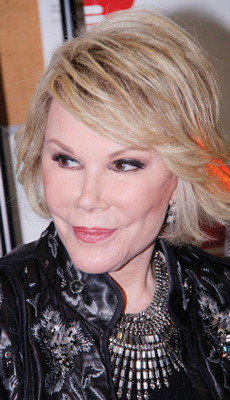#SorryImNotSorry
Permanent link All Posts
Between the High Holidays, many of us are reminded to apologize to our loved ones for our wrong-doings. This fall, I also find myself ruminating over whether we, women, should apologize less in our everyday lives.
After Joan Rivers passed away, I began pondering how a woman so outspoken—and oftentimes offensive—was loved and respected by so many. Rivers’ persistent, unapologetic and humorous approach transcended generations. In the end, we all respected Rivers, no apologies needed.

While Rivers began her career by paving the way for female late-night talk show hosts during the 1960s, many young people today will remember her as a sassy old Jewish lady with enough shtick to say whatever was on her mind. Rivers was like an amplified and funnier version of the Jewish relatives we know and love. She made us laugh, but more importantly, she also taught women everywhere that it’s OK to speak their minds.
“Sometimes apologies come too easily and too frequently,” said Juliana Breines, a UC-Berkley psychology Ph.D. and author of the PsychologyToday.com article “In Love and War.”
“We apologize for things that are clearly not our fault, not in our control, or otherwise unworthy of an apology,” Breines said. “Examples include apologizing for being hurt by someone else’s offense, apologizing for being over-sensitive, apologizing when someone else bumps into you, and apologizing for apologizing.”
I often find myself guilty of these “unworthy” apologies and witness many other women behave similarly in acts of over-politeness.
Breines went on to cite a study in her article, which found that women may be more prone to over-apologize than men. Similarly, the study found women reported committing more offenses than men. In her research, she also found that men might have a lower offense threshold than women do.
“Women may sometimes be over-attuned, apologizing for perceived offenses that other people do not find offensive or even notice,” Breines said.
I could write a novel about how women are socialized to cooperate and men are socialized to compete—and many books have already been written on the matter. Evidence of these gendered socializations can be found in the minutia of our everyday lives.
A couple of weeks ago at work, I was standing and talking with my coworker and she suddenly sidestepped and apologized as another coworker crossed into her path. She then shook her head disappointedly and explained to me that she had resolved to stop apologizing for the space she’s occupying.
This moment was so simple, but it gave me reason for pause. I apologize constantly: I move aside when I’m already occupying a space someone is entering; I rush to apologize when I nearly bump into someone as we cross paths; I apologize during meetings; I apologize during large-group discussions when I have a point; I apologize when someone stubs their own toe, isn’t feeling well, having a bad day, or even when someone else has treated them badly; and sadly, sometimes I apologize even when the other person has treated me badly. Generally, I apologize too much for everything, and when examined more closely, the word, “sorry,” has lost much of its meaning.
In a June 2014 Forbes.com article titled “Why Are Always Apologizing?” contributor Ruchika Tulshyan examined Pantene’s “Not Sorry” commercial , which plays on the stereotype that women over-apologize and should go forth proudly. Of course, the commercial is about hair, but it’s also a commentary on how women behave.
The commercial opens with various scenarios, in which women apologize for asking questions at meetings, for asking the time, for bumping into someone, etc. The commercial replays itself without apologies to send the message that women should stop apologizing.
“Saying sorry doesn’t necessary equate to showing weakness,” Tulshyan said. “But, the commercial makes social commentary on how women, more than men, feel apologetic about sharing their ideas, or their space, or … everything, actually.
“This commercial specifically highlights moments where women apologize when they’re not in the wrong,” Tulshayn added. “Handing over your child to your partner because you have other things in your hand? Asking a question in a meeting? An apology doesn't seem to fit. And yet, I’ve lost count on how many times I’ve heard a ‘sorry’ in precisely these places.”
I’m starting to think “I’m sorry” should not be a catch-all for expressing regret, empathy, sympathy, remorse, and so on. While women don’t intend for it to be a “tell” of weakness, it certainly isn’t making us stronger in its overuse.
Breines offers alternatives and solutions to blurting out “I’m sorry,” which I found useful. She suggests thanking another person, rather than apologizing for receiving a favor; she advises to save the “I’m sorry’s” for when they count; avoid repetitive bad habits when possible; apologize for your share of the conflict and no more; embrace your own imperfections and don’t apologize for them; and seek support when needed.
With the Jewish New Year upon us, I challenge myself and women everywhere to strive to own the space we occupy, stand behind our opinions and offer them freely, take ownership over our faults and our strengths equally, and apologize in a manner that is proportionate to the problem at hand without compromising our self-worth.
May this New Year give us strength to trust ourselves more and truly make our “sorries” count.
Just remind yourself: WWJD—What would Joan do?
To read more posts in the “Oy! Forgive Me!” blog series, click here.



.jpg)



